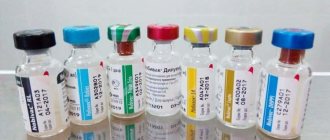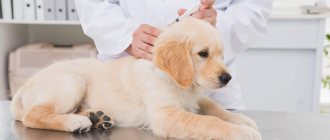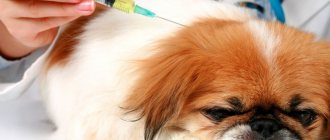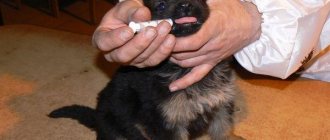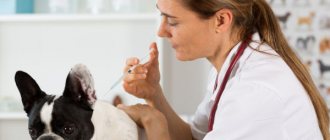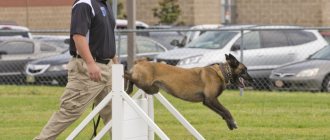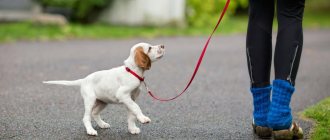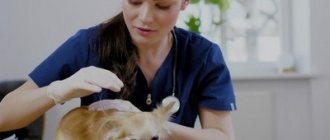First vaccination for Alabai puppies
It is very important to have it done before the teeth change, otherwise the dog may become seriously ill during this vulnerable period. But there is no point in getting the first vaccination too early, since small puppies receive the necessary immunity from their mother’s milk and do not walk outside, which reduces the risk of the disease to zero.
The optimal age for the first vaccination is 2 months, but it can be done earlier, at the age of 5-6 weeks. In this case, the Alabai will pass to the new owner already vaccinated. A more correct approach is when the first vaccinations for puppies are the responsibility of the breeder. He sells his puppies after deworming (a procedure for expelling worms from the body) and vaccination, thus providing health guarantees for the little Alabai.
But keeping large breed puppies up to three months old near their mother is also quite difficult, so many breeders give the first vaccination by 1.5 months. This is followed by repeated vaccination (re-vaccination) with the same drug two weeks later. It is very important that the same drug is chosen for the second vaccination as for the primary one, so if you buy a puppy between these two vaccinations, be sure to discuss this issue with the breeder.
Alabai vaccination table by age
To systematize the timing and required vaccinations according to the animal’s age, you can use a convenient vaccination table for Central Asian Shepherds.
| № | Animal age | Procedure name | Name of the drug |
| 1 | 2 months | First vaccination | Nobivac DHPPI2+Lepto |
| 2 | 3 months | Second vaccination | Nobivac DHPPI2+Lepto |
| 3 | 6 months | Third vaccination | Nobivak DHPPI2+Lepto+Rabies |
| 4 | 1.5 years | Fourth vaccination | Nobivac DHPPI2+LR |
| 5 | Annually | Annual vaccination | Nobivac DHPPI2+LR |
Compliance with the terms and conditions for preventive deworming and vaccination of Central Asian Shepherd puppies helps protect your beloved pet and the owner’s family from serious infectious diseases.
Preparation and Precautions
The first vaccination is very important. And you need to be well prepared for such a procedure. First, adjust the puppy’s diet - it should be familiar to him, nothing new.
Related article: How to choose and care for a Caucasian Shepherd puppy
A week before such an important event, your German Shepherd puppy should be checked for helminths and given a special drug against these parasites. Next, you should monitor your pet. If he is cheerful, active, eats well, you can go for an injection. But it is better that the German Shepherd is vaccinated at home, since various infections can be picked up at the veterinary clinic.
If your “baby” is lethargic and does not want to eat, then they refuse vaccination for a while. In this case, the puppy should be shown to a doctor.
When to get vaccinated? It's best in the morning, on an empty stomach. Before this, the pet’s temperature is taken, and two days later he can be given antihistamines. On the day of the injection, you need to provide your pet with complete rest and plenty of fluids.
Preparation for vaccination and its cost
- Observe the dog's condition. Vaccination is given only to healthy animals. The puppy needs to measure its temperature for a week before vaccination, monitor the condition of its stool and mucous membranes.
- Deworming before each vaccination.
- Avoid walking with the puppy before vaccination, do not let them into the hallway, and remove dirty shoes.
- Provide proper and nutritious nutrition for your dog.
- The interval between vaccinations should be at least 3 weeks.
Should I vaccinate at home or in a clinic? This question worries many owners. The clinic stamps it and the procedure is cheaper. Sometimes the rules for storing vaccines are not followed. The ideal option would be to call a trusted doctor at home from a good clinic. The veterinarian can take the passport with him and stamp it at the clinic. A puppy that is vulnerable to infection will be safe in a calm environment.
What to pay attention to before vaccination?
The main thing is that the dog must be healthy!
Do not give more than one vaccination per day, although it should be noted that today there are many multi-vaccines (polyvalent), where one injection replaces several. Be careful with the leptospirosis vaccine; it is only given to an adult dog, not a puppy, as it has a strong side effect. Approximately 10 days before vaccination, it is advisable to carry out deworming (get rid of worms). After each injection, the puppy may look sick and behave strangely, but do not panic, these are temporary consequences.
Finally, for those who are especially impressionable, I would like to note that your pet will most likely whine and squeak, because no one likes injections, but if you want a healthy and long future for your dog, get the necessary vaccinations!
The site also has an article: “When and how to start training a German Shepherd.”
Features of caring for an Alabai puppy
Proper nutrition is the main component of caring for your dog. After the baby arrives in its new home, for the first time it is fed the same food as the breeder gave it.
With natural feeding, the following is gradually and sequentially introduced into the Alabai puppy’s menu:
- milk and fermented milk products;
- porridge (first milk, then water);
- finely chopped meat;
- egg yolks;
- raw vegetables (except potatoes and beets);
- fruits and berries;
- sea fish.
If the owner has chosen artificial nutrition, premium puppy food is chosen from industrial food.
General recommendations for feeding puppies:
- food should be served at the same time;
- Preferred food temperature is room temperature;
- if the puppy does not eat, the bowl is removed until the next feeding;
- if the puppy has not finished eating, the bowl also needs to be removed;
- within 1.5–2 hours after eating, you should not physically burden your pet;
- number of feedings up to 3 months - 6 times a day, up to 6 months - 4 times a day, at six months of age - 3 times a day;
- The dog should always have access to water.
What types of vaccines are there?
Everyone will agree that vaccination is necessary for every German Shepherd and this is the only way to protect the dog from possible diseases. But the topic of what drugs, how to use them and for what diseases is the subject of constant discussion in veterinary medicine. Many doctors have their own calendar for injections, different from others. My advice is don't be afraid to ask your vet questions. It is advisable to hear several opinions.
To better understand what vaccination gives your shepherd, I suggest looking at its mechanism of action.
A vaccine works by strengthening an animal's immunity to a specific disease. It stimulates the immune system with a non-pathogenic virus or bacteria that changes so that it no longer poses a threat to the dog's health.
To enhance the effect of the vaccine, the procedure is repeated after some time. Puppies receive additional doses every two to four weeks, as at this time in their lives the maternal antibodies that protect the body disappear and the need for external stimulation of the immune system arises.
As we wrote above, vaccines for vaccination of German shepherds are polyvalent, when one injection is given against several diseases, and monovalent (one injection - one disease). It is believed that it is preferable to use monovalent drugs for puppies, for the reason that they are able to focus on each individual disease, and this guarantees the best result. Polyvalent vaccines, in turn, are more often used to vaccinate adult dogs. It should be noted that this theory has both supporters and opponents. For example, I bought only polyvalent ones (“Hexadog” and “Nobivak”) and was completely satisfied with the result.
Recommendations for raising an Alabai puppy
It is very important to have it done before the teeth change, otherwise the dog may become seriously ill during this vulnerable period.
But there is no point in getting the first vaccination too early, since small puppies receive the necessary immunity from their mother’s milk and do not walk outside, which reduces the risk of the disease to zero. The optimal age for the first vaccination is 2 months, but it can be done earlier, at the age of 5-6 weeks. In this case, the Alabai will pass to the new owner already vaccinated. A more correct approach is when the first vaccinations for puppies are the responsibility of the breeder. He sells his puppies after deworming (a procedure for expelling worms from the body) and vaccination, thus providing health guarantees for the little Alabai.
But keeping large breed puppies up to three months old near their mother is also quite difficult, so many breeders give the first vaccination by 1.5 months. This is followed by repeated vaccination (re-vaccination) with the same drug two weeks later. It is very important that the same drug is chosen for the second vaccination as for the primary one, so if you buy a puppy between these two vaccinations, be sure to discuss this issue with the breeder.
Now everyone prefers polyvalent vaccines, when one vaccination provides immunity against several diseases at once. The standard set in one vaccine is protection against plague, enteritis, hepatitis and adenovirus. Vaccination with Nobivak Puppy is popular among veterinarians and veterinarians. The vaccine designated DP produces antibodies against canine distemper and enteritis.
This vaccination can be given as early as 4 weeks of age. Then it is repeated after two weeks. You can also choose a different vaccination schedule using other vaccines from this manufacturer. The designation on the Nobivak DHP label indicates that the vaccine protects against plague, enteritis and hepatitis. This vaccination is given at the age of 8-9 weeks and repeated at 12 weeks.
You can choose a vaccine that additionally includes protection against the parainfluenza virus. It is called Nobivak DHPPi and is used according to a similar scheme: the first vaccination at two months of age, repeated at 12 weeks. The second vaccination is done approximately 7 months after changing teeth.
The timing of this vaccination is individual, it all depends on when the important period of teeth change is completely over. It is not recommended to give a second vaccination before the change of teeth, since this is an extra burden on the body and, according to the observations of dog breeders, some deviations in the development of the dog have been noticed, for example, growth slows down. Modern veterinarians advise not to do this vaccination at all if you have previously received a two-time Nobivak DHPPi vaccination.
It is believed that this drug provides reliable immunity that lasts for one year. Therefore, you give the next vaccination only one year after the last vaccination at 12 weeks of age. But if you had your first vaccination with Biovac, then a second vaccination after changing your teeth is necessary.
It has been noted that modern imported rabies vaccines are more gentle, and puppies tolerate them better. Although many imported manufacturers claim that the rabies vaccine is valid for 3 years, it is better not to take risks and vaccinate against this terrible disease annually.
The fact is that in our country there is a high probability of infection from wild and stray animals, so the virus is more active and stable. The third vaccination for Alabai puppies against infectious diseases is done at the age of 12 months and then repeated annually. 2 weeks before vaccination (except for revaccinations), anti-worm medications are given.
Hello, I bought a 1.5 month old Alabai puppy. What medications will need to be given, what vaccinations will I need to get?
The first vaccination for a puppy should be done before the period of loss of baby teeth. At this time, the dog is in a vulnerable state and is more often susceptible to infections and diseases. The immune system is working hard, it is better not to burden the animal with unnecessary stressful situations.
Alabai puppies are strong and hardy; the optimal age for vaccination is the fifth week. With the indicated vaccination schedule, the dog will already be in the hands of the owner with the necessary procedures; in rare cases, the person will have to improve the dog’s health with the help of medications. This is an important point; some dog breeders believe that medications should be taken constantly, especially vitamins. The opinion is wrong. The dog’s body is able to cope with many minor diseases on its own.
If a dog regularly takes medications, the immune system becomes weakened and any infection becomes the cause of a serious infection, the outcome of which is not always positive.
It is better for the owner not to adopt a puppy until it is two months old. Too much responsibility is placed on the person; a thorough knowledge of parenting skills will be required. The anxiety associated with vaccinations and taking all kinds of vitamins rests directly with the breeder, who is obliged to provide the owner with the appropriate veterinary passport, where the procedures undergone by the puppy are noted in a professional hand.
If the epizootic situation is favorable, young dogs at the age of 2 months must be vaccinated against:
- plague;
- infectious hepatitis;
- parvovirus enteritis;
- leptospirosis.
Until this age, walking and contact of a young pet with adult animals is prohibited. Rabies vaccinations are recommended before or after changing teeth, that is, at the age of 3 months or 6 months.
Veterinary specialists have developed a vaccination calendar regulating the procedure for vaccination by month. Vaccinations for Alabai puppies in the absence of outbreaks of infectious diseases are given at 2, 3 and 6 months. Thus, before a year, a young dog should be vaccinated three times.
The choice of vaccines for vaccinating an Alabai puppy is extensive.
The next vaccination of young animals is provided at the age of 15-18 months. The procedure must be repeated once a year. The dog must be healthy at the time of vaccination. Before vaccination, it is necessary to carry out preventive deworming.
Vaccinations for Alabai can be given with both mono- and polyvalent vaccines. Storage conditions and vaccination schedule must be observed. Single vaccines provide immunity against one specific disease. Polyvalent vaccines include several non-pathogenic strains of viruses and bacteria. Currently, domestic and foreign polyvalent vaccines are used everywhere for vaccination:
- Nobivac;
- Eurican;
- Vanguard;
- Canigen;
- Duramune;
- Hexadog.
These immunobiological drugs act quite gently on the delicate organism of growing young animals, causing a minimum of side effects.
The age of a small animal at which the first vaccination is carried out depends on the health and sufficient amount of breast milk in the lactating bitch, overcrowding and the epizootic situation. The first vaccination for an Alabai puppy born from a vaccinated mother, fed with breast milk when kept in favorable conditions and without the spread of infections, is given at the age of 8 weeks.
A nursing bitch passes antibodies to infectious diseases to puppies through breast milk. By 2-3 months, the amount of antibodies in the blood of small dogs decreases sharply, which determines the timing of the first vaccination for a Central Asian Shepherd puppy. Early vaccination is not advisable under these conditions. Young animals do not have a developed immune system, so vaccination will have little effect.
Mother’s “vaccine” still works in newborn Alabai puppies
For artificially fed babies or young pets obtained from unvaccinated bitches raised in crowded conditions or unfavorable epizootic conditions, forced early vaccination is provided. In such cases, it is permissible to give the first vaccination to a dog already at one month of age or at 5-6 weeks, depending on the type of drug used. In our country, foreign polyvalent vaccines are used for early vaccination: Nobivac Puppy DP, Duramune Max 5 or Vanguard.
OR EDUCATIONAL EDUCATION FOR BEGINNING DOG OWNERS
We always accompany the puppies we sell with a sales contract and several more sheets with recommendations for raising them. But, judging by sad experience, it seems that some owners of puppies do not consider it necessary to look there at all, or simply lose them. Therefore, we decided to duplicate these recommendations here on the site, maybe someone will find them useful.
We suggest you read: Why does a cat lose hair, what to do in case of intense hair loss
It can be especially offensive when you repeat 10 times to the happy owner of a puppy what and how to do - and a year later he calls and says - we didn’t do anything that you said (why is it interesting?) and we have such and such problems - what should we do now? Do nothing - dry the crackers, many serious problems can arise from improper raising of such a large and heavy dog - which, alas, cannot be corrected in adulthood.
1 - The first and very common mistake that beginner (and sometimes not even beginner) dog owners make is overfeeding the puppy. Usually accompanied by statements like - he’s so cute and looks into his eyes - how can you refuse him food... Easy and simple - if you want to have a healthy and happy dog in the future.
A healthy puppy SHOULD GROW THIN. Specifically, a skinny bicycle—one whose ribs can be easily felt. Since the breed is large, bony and grows very quickly - if the puppy is overfed - the ligaments simply do not have time to develop harmoniously with the excess weight, and a number of different problems with the puppy's paws can arise.
Exceptions to the rules
Sometimes the vaccination schedule may shift. Typically, this may be influenced by the following factors:
- Epidemiological situation in the area. The standard vaccination schedule may change based on dangerous outbreaks of infection. In this case, puppies can begin to be vaccinated at one month of age with special vaccines.
- Being forced to move early can also shift your schedule. In this case, you must adhere to the following rule: vaccination should be given no earlier than one month of age and no later than 10 days before the planned trip.
- Particular attention should be paid to puppies raised without a mother; a very important factor is how many days the first vaccination was given. Since, on the one hand, they need to increase their immunity, and on the other, try to carry out immunization in the most gentle manner. They can begin vaccination at 6 weeks of age, and subsequently reinforced at 9 or 12 weeks.
Physical activity for the Central Asian Shepherd
You need to take your Alabai for walks from the age of 3 months. For harmonious development and to prevent problems with excess weight, you need to walk several kilometers a day.
The optimal number of walks: 2 times a day for at least 1 hour. This is a serious breed, and therefore it needs to be socialized so that there are no problems in the future.
However, it is better to let even a trained Central Asian Shepherd dog off the leash only in specially designated areas.
Important! Alabai must be taught to wear a muzzle.
Advantages and disadvantages
When deciding to vaccinate German Shepherd dogs, the owner must understand that he is saving the pet’s life. After all, without a vaccine, many small dogs die.
Similar article: How to keep a Mongolian Shepherd Dog
At the moment, there are many clinics that provide vaccination services. Professional veterinarians provide clear advice and monitor the dogs. Protected pets are not afraid of dangerous diseases, and their immunity will be stronger.
It is such comprehensive measures that are aimed at monitoring the health of the animal and stopping the spread of dangerous diseases that can even harm people.
Of course, there is always a risk for puppies. There are cases of complications, but with proper examination of the pet and compliance with all rules, these risks can be easily minimized. It is the vaccine that effectively prevents diseases. Therefore, you should think about it for your dog, and administer such drugs correctly, observing all the conditions.
Why do you vaccinate a dog?
Many viral diseases can not only lead to the death of animals, but also undermine the health of its owner. The most common diseases include:
- Plague. It is an infectious disease that leads to death in animals.
- Rabies. The vaccination is included in the list of mandatory vaccines due to the impact of the virus on humans. Leads to death in animals and humans.
- Leptospirosis. An infectious disease that leads to the death of the body.
- Viral hepatitis. A viral disease that is characterized by chronic damage to the liver and central nervous system.
- Parainfluenza. An infectious disease transmitted by airborne droplets from a sick animal to a healthy one.
- Coronavirus enteritis.
- Parvovirus enteritis. An intestinal infection leading to complete dehydration of the body.
The choice of vaccine is voluntary and the dog owner can independently choose a domestic or imported drug. The difference between medications lies in their price and method of administration. The medicine can be administered to the dog subcutaneously or intramuscularly.
Vaccinations for adult dogs
It is necessary to vaccinate not only puppies, but also adult dogs; they also need protection from infections. The vaccination schedule for an adult animal recommends an injection every 12 months. It is necessary to vaccinate against rabies every year, and other types are allowed to be administered once every 2-3 years, but this is subject to the absolute health of the dog. Rabies vaccination is often included in a comprehensive vaccination program.
When a dog reaches 8 years of age, mandatory vaccinations depend on its health. If your pet has chronic diseases, you can refuse vaccination, as it can only worsen the dog’s condition. However, the owner does not have the right to refuse rabies vaccination, as this is prohibited by law.
Vaccinations for Alabai dogs and their consequences
This strong and healthy breed tolerates vaccination without problems. Mild malaise in a dog, lack of appetite, drowsiness, lethargy are normal reactions for any dog. As a rule, this condition goes away after 2-3 days. However, you should take care of your pet during this period: do not disturb him, allow him to get a good night's sleep, and do not force him to eat if he does not want to. But he should be given constant access to drinking water, otherwise dangerous dehydration may occur.
Excessive salivation, shortness of breath, blue or red skin are all symptoms of an allergy to substances contained in the vaccine. If the owner does not pay attention to this, death is possible. You should urgently call a veterinarian who will perform medical intervention. At the same time, it is necessary to give the animal some kind of antihistamine that is intended for humans. If the dog has already had allergic reactions, it is better to call a specialist at home for subsequent injections: mostly sick pets are brought to the veterinary center, so the risk of infection there increases significantly.
A dog can also get sick if the vaccination was given during illness. In this case, the active substance will cause even more harm to the weakened body. If you feel unwell, you should seek the help of a professional who will prescribe treatment.
Many dogs develop bumps after injections. This is a normal phenomenon and most often goes away quickly. If the lump only gets bigger, you should seek help. The veterinarian will prescribe a drug or even perform surgery, which you should not be afraid of.
What vaccinations does a dog need?
What vaccinations do German Shepherd puppies get? There are several of them, and they are all very important. There are a number of mandatory injections that are administered during certain months of a dog’s life. But there are also those that are recommended for dog lovers. Whether to introduce them or not is up to the dog owner and the veterinarian to decide. German Shepherd puppies must be vaccinated against the following diseases:
- infectious hepatitis;
- parvovirus infection;
- arboviral enteritis;
- plague;
- rabies;
- leptospirosis;
- parainfluenza
Similar article: Weight and height of a German Shepherd puppy by month
Vaccines are administered according to doctor's recommendations and schedule. This allows you not only to build your pet’s immunity, but also to protect it from dangers. If you deviate from the table, the administration of injections is controlled by a doctor.
What vaccinations and when are Alabai given?
Alabais are hardy dogs, famous throughout the world for their excellent health, but this does not relieve their owners from the obligation to vaccinate them.
Vaccination is necessary to protect dogs from dangerous infectious diseases against which natural immunity is powerless. Almost all owners of these dogs admit that vaccination is necessary for Alabai dogs. But there are still a lot of unclear issues related to the vaccination schedule and the choice of vaccines.
The sequence of vaccinations depends on the individual characteristics of a particular dog, the date of the first vaccination and the vaccine used for vaccination. The starting point in the vaccination calendar is the first vaccination, on which the dog’s health largely depends.
Asians and Central Asian Shepherds at birth have poor health due to genetic characteristics. An unvaccinated pet should not be walked. He should be protected from contact with an infectious individual, as this is fraught with a severe course of the infectious disease. The young animal may develop serious complications from which it may die.
Veterinarians recommend vaccinating young pets against the following infectious diseases.
Parvovirus enteritis is a contagious viral pathology that occurs with damage to the myocardium and respiratory organs, profuse diarrhea and vomiting. It often ends in death.
Carnivore plagues
Distemper - Infectious hepatitis - Hepatitis infectiosa is a contagious viral disease characterized by disruption of the nervous, respiratory and digestive systems. Mortality rate is 90%.
Central Asian Shepherd puppies should be vaccinated from childhood
Leptospirosis
L. jcterohaemorrhagiae, L. canicola, L. pomona, L. Grippotiphosa is a bacterial disease that is dangerous to humans. Sick puppies experience jaundice, kidney and liver damage, digestive disorders and neurological symptoms. The young die from heart or liver failure.
Rabies
Rabies is a contagious viral disease, dangerous to people, characterized by damage to the nervous system, paralysis, aggression, 100% mortality.
Parainfluenza
Parainfluenza Bordetella bronchiceptica is a viral pathology that occurs with damage to the respiratory system;
Adenovirosis
Adenovirosis cani - A. is a viral disease characterized by symptoms of damage to the respiratory organs and high mortality.
Vaccination of the Central Asian Shepherd is an absolutely voluntary procedure. You can vaccinate your baby yourself, from a breeder or at a veterinary clinic. If Central Asian Shepherd puppies do not have vaccinations against leptospirosis and rabies, their owners may be punished in accordance with the Code of the Russian Federation.
Vaccination schedule for dogs
What vaccinations are given to dogs and when? The puppy's first vaccination is against enteritis or hepatitis. A bivalent vaccine can be used. Revaccination is carried out after 10-14 days. This vaccination is easily tolerated. After two weeks, stable immunity is developed. A year later the vaccination is repeated.
At 2.5 months, a plague vaccination is carried out. You cannot walk your puppy for 3 weeks after vaccination. The puppy is vaccinated again at 6-7 months, when the growth of permanent teeth ends.
At 8 months the dog is vaccinated against rabies. It can be done from 6 months, but due to anti-plague revaccination, it can only be done at this age. How often should my dog be vaccinated against rabies? The next vaccination should occur 12-13 months after the previous one.
Re-vaccination against most diseases is carried out every year.
Puppies are given polyvalent vaccinations against a wider range of diseases. The owner is simply obliged to protect his pet from the most dangerous diseases.
Veterinarians may offer their own vaccination options. The most popular is presented below. For convenience, a table is provided.
Where should Central Asian Shepherds be vaccinated?
If your pet does not participate in exhibitions and competitions, it is permissible to vaccinate your dog yourself, observing the storage conditions of the drug and the vaccination schedule. However, it is recommended to vaccinate the animal at the breeder and at the veterinary clinic to be able to provide first aid in the event of an allergic reaction to the administered drug. The specialist conducts a preliminary examination of the dog, determines exactly how much vaccine needs to be administered depending on the weight, and issues a veterinary passport with a note about the type of drug and the date of vaccination.
Mandatory conditions for each vaccination procedure are:
- deworming 10-12 days before vaccination. The first deworming is carried out in two stages at the age of 3 weeks with Pirantel or Drontal Junior. The following procedure is performed at 5 months, then 10-12 days before the upcoming vaccination with Canikquantel, Pirantel, Milbemax, Azinox;
- gentle mode. Before the first vaccination and for 3 weeks after it, it is not recommended to walk with your pet or bathe the animal. Conduct active training and games, change the environment and diet;
- health. Absolutely healthy dogs with normal appetite, body temperature and activity, clean eyes and nose are allowed for vaccination. Vaccination of a sick animal can cause complications or death of the animal. It is not recommended to vaccinate females in heat, lactating females, or young animals during the change of teeth;
- reaction control. An acceptable reaction to the vaccine is the formation of a slight swelling, an increase in body temperature to 39 C, lethargy, vomiting or diarrhea on the day of injection.
The dog requires the help of a specialist with thickening and enlargement of the lump at the injection site, an increase in body temperature up to 40C, prolonged vomiting, diarrhea and lethargy.
It is safer to vaccinate Alabai in a clinic, where a doctor can first examine the pet.
